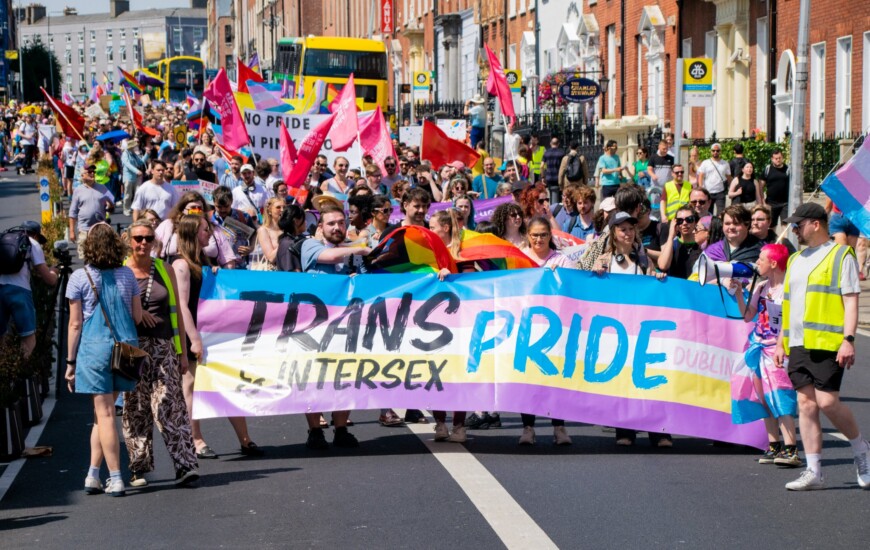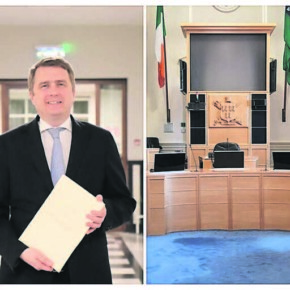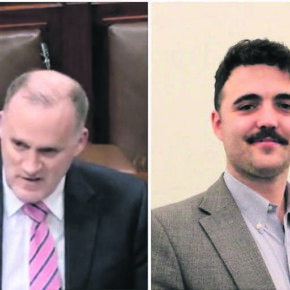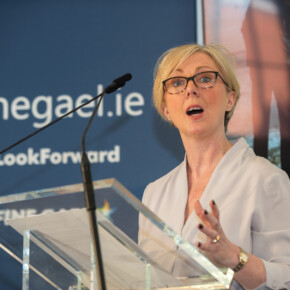Will the real Sinn Féin please stand up? Trans row reveals divide in party
Mike Finnerty 07 May 2025
Over the next few years, Sinn Féin has a choice to make – what kind of voters do they want to chase?
Do they chase the god and country vote (the populist kind that blames the Greens for the €400,000 bike shed despite the fact the Greens didn’t have oversight of the Office Of Public Works in the last government, it was Fine Gael) or do they chase the city cosmopolitan vote that has brought Labour back from the brink and made the Social Democrats real contenders?
Multiple polls in 2022 had Sinn Féin polling at 35%, enough for near-enough 70 Dáil seats, but the comedy of errors which befell the party between late 2022 and late 2024 has enough material to fill a boxset.
The recent drama around the party surrounding the trans issue is the latest example of why Sinn Féin aren’t in government right now and reveals that Sinn Féin no longer enjoys the support it once had among the LGBTQ+ community.
In a set of events that few saw coming, Sinn Féin’s health spokesperson, David Cullinane, agreed with a decision made by the British Supreme Court.
In April, the British Supreme Court ruled that the terms “woman” and” sex” in the 2010 Equality Act refer to “a biological woman and biological sex”.
That alone is news-worthy – since when did Sinn Féin care about what the British establishment had to say? – but what has Labour, Soc Dems and PBP sharpening their knives is Cullinane’s calling the British Supreme Court ruling “common sense.”
Sinn Féin’s health spokesperson being on the same side of a contentious social issue backed by JK Rowling, Donald Trump, the Tories and Elon Musk is enough to make someone think they woke up in a parallel reality.
Likewise, Sinn Féin’s chief whip Pádraig Mac Lochlainn said on Highland Radio that “we need to have the conversation” surrounding trans rights in Ireland, saying “the legislation isn’t clear” (despite the Gender Recognition Act of 2015 providing clarity on the topic).
In their 2020 manifesto, the party promised to ban the practice of conversion therapy; a promise that was dropped in their manifesto for 2024.
Likewise, Sinn Féin’s 2020 manifesto promised to “prioritise development and roll-out of a more inclusive relationships and sexuality education curriculum”; such commitments were dropped from the 2024 manifesto but were included in manifestos for Labour and the Social Democrats.
The ruling Sinn Féin government at Stormont also accepted advice from the outgoing Conservative government in the United Kingdom that trans youth in Northern Ireland should not be prescribed puberty blockers, a move which fractured a once-strong relationship with the LGBTQ+ community.
The recent furore of controversy has led to Trans and Intersex Pride Ireland threatening to ban Sinn Féin from this year’s march unless their stance on trans issues is clarified.
In a statement in April, the organisers of the march said, “should Sinn Féin not clarify their position, Trans and Intersex Pride Dublin has come to the decision that Sinn Féin will be banned from attending our march in July.”
“This decision is made in solidarity with trans people up north, and to avoid the party’s pinkwashing of their record in the south,” they wrote.
The organisation said, “we have always banned government parties from joining our march, the same parties who have brought us the worst trans healthcare in Europe, but a real alternative to Fianna Fàil and Fine Gael can’t be one that will sell out the trans community.”
In the case of Cullinane and Mac Lochlainn, one could make the cynical argument they are responding to what their own voters want – in Cullinane’s constituency of Waterford, the March 2024 referendums on Family and Care were rejected by 67.1% and 73.4% and in Mac Lochlainn’s constituency of Donegal, the margins were 80.2% and 84%.
More pointedly with Mac Lochlainn, Donegal was the only constituency to vote no on Repeal in 2018; coupled with a strong Sinn Féin and republican vote in the area, it’s clear Donegal’s voters are interested in Irish unification and heavy social spending, but don’t care for pronouns.
Both Aontú and Independent Ireland have made a point of being hardline social conservatives on most issues.
Notably, when Independent Ireland MEP Ciaran Mullooly joined Fianna Fáil’s European Parliament grouping Renew last summer, party leader Michael Collins said by joining the grouping, the party would be “supporting silly stuff like men being allowed to use women’s public toilets.”
Yet, these are the people that Sinn Féin have bent over backwards trying to appeal to, not Social Democrats, Labour, PBP or Green voters.
In the most recent Red C Poll, Aontú and Independent Ireland are on joint 10% support Dublin-wide, independents are on 7%, while Labour and the Social Democrats are on 8% apiece.
Among the key C2DE demographic (posh media speak for working class), Sinn Féin enjoyed 42% support in that demographic in September 2022, dropping to 30% in March 2025.
In the ABC1 category, the office worker to management demographic, Sinn Féin enjoyed as much as 29% of that vote, before it dipped down to 16%.
Middle-class progressives don’t want Sinn Féin because of their inconsistent stances on social issues such as immigration and now, trans rights.
Worker-class social conservatives don’t want Sinn Féin because they now see Sinn Féin as part of the establishment that would merely uphold the status quo.
Therein lies the rub for Sinn Féin; what kind of voter do they chase?
Office worker or shop assistant? City dweller who uses Bluesky or rural voter who gets their news from Facebook? Person who puts pronouns in their email signature, or someone who rolls their eyes whenever they see a female pundit on a sports panel?
When asked about his colleagues’ comments on the Cullinane controversy, Dublin TD Eoin Ó Broin told The Journal, “I’ve been contacted by quite a few constituents who are trans or family members of trans people who are very upset by it.”
He added that the party was working on legislation which would “further develop” policy on transgender rights and transgender healthcare and said that Cullinane “did the right thing” by removing the tweet and apologising.
Party leader Mary Lou McDonald appeared on the Late Late Show and discussed Sinn Féin’s stance on the issue, saying it has “not changed” and the party has only waded into the issue as it pertains to Northern Ireland.
McDonald said that the broader conversation around trans rights “needs to happen in the right atmosphere,” saying that Ireland should not go down the same path the UK has on the issue.
“We need to reassure each other that we’re starting from a position of respect,” she told host Patrick Kielty, describing her trans sister as “compassionate and clever and accomplished.”
“She’s loved without measure and unconditionally, and I want her to live a full and authentic life; I want that for every human being.”
Respect is the one thing Sinn Féin could depend on from the LGBTQ+ community; now, it is in short supply.











